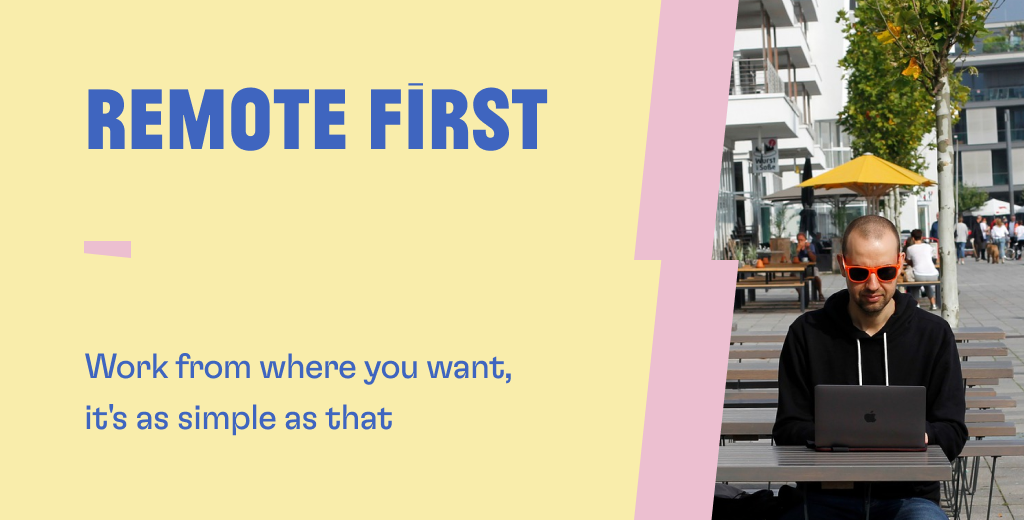The professional world is changing, workplaces are evolving and some companies quickly understood this. To keep your best employees, you must offer the best working conditions you can. A decision which instantly puts your company on the right side of history and strengthens your employer brand.
From Google, which is spreading remote working with its "hybrid" model, to Accor, which is reinventing itself to welcome nomadic workers, flexibility - especially in the tech sector - is the new master word. As back to work movement is slowly taking place, companies only have one target : to offer the best work experience to their teams.
Welcome to the culture of flex office and remote first.
A Spaycial culture
The COVID crisis brought out a strong human axis for companies : employees are looking to mix comfort, autonomy and work. "There is no sense after the epidemic for everyone to return to the office in Taylorism mode, a model that no longer corresponds to aspirations, says Arnaud Gien-Pawlicki, Head of Talent at Spaycial, which is moving to flex office and remote first on September 1st, 2021.
Remote working has always been around, but now it has become an integral part of our operation. Without it harming the company's efficiency: more than nine out of ten companies now offer their employees a remote working option.
The flex office and this freedom to work wherever you want, from home, the office or elsewhere, goes far beyond simple work organization. When you become remote first, it's a corporate culture," explains Arnaud Gien-Pawlicki. From now on, you have to think about everything you implement for remote while not discriminating in the organization of work, whether your employees are telecommuting or in the office: that's the biggest challenge." Spaycial thus intends to break out of the office-telecommuting divide and turn it into a strength, drawing benefits from both.
"The real issue has always been how to collectively meet to our performance objectives.So what strength are we talking about? Not the least of which is recruiting and retaining its employees. "A company, especially an accelerating startup, that is not open to this flexibility will have problems attracting good profiles," assures the Head of Talent. We have a real need for quality of life at work to open up the talent market. The real modernity is to bring flexibility to the employee so that he/she can adapt his/her work organization according to his/her life cycle. The real issue has always been how to collectively meet our performance goals in an environment where speed of execution is key, by supporting everyone to excel and become better together."
In addition, Spaycial has just recruited its first 100% remote UK-based employee, a salesperson. He is French, had the best profile and from then on it didn't matter where he was. "And it even opens up the possibility of a local team", adds the HR Director.
A real challenge to adapt...
But Rome wasn't built in a day and not every company can switch to flex office and remote first in a snap. "We were remote friendly at first, with limits like telecommuting only allowed on Tuesdays and Thursdays before Covid-19 became a transformation gas pedal. From the end of March 2020 until today we tested different formulas before finding the one that best suited us last May," recalls Arnaud Gien-Pawlicki.
We need to "get over our teenage crisis", he laughs, noting the challenges of moving from a "100% oral culture to a written culture", in a context where office life and the coffee machine have come to an end, and where knowledge is less shared. Especially since Spaycial has doubled its workforce during the COVID-19 pandemic, making this challenge even more demanding. "For new employees, we need to build informal moments that are key to getting to know each other, because we remain social animals looking for regular interactions to build the foundation for better collaboration and trust. These moments are present at Spaycial, like our virtual coffee", says Madior Dieng, Head of Data.
____________________________
The remote first at. Spaycial is designed in two formulas :
- Option 1: a package of three free days of telecommuting per week, with the possibility of going full remote if desired, for one month each quarter, in a time zone with a maximum time difference of 2 hours from the headquarters in Paris.
- Option 2: Full remote - opening the way to the recruitment of remote people - respecting this same time zone of more or less 2 hours from Paris.
Employees can switch from one formula to the other twice a year.
____________________________
... for a better operation!
According to Madior Dieng :
We need to know where we are, what's going on, and where the blockages are. This increased transparency and agility offered by this culture is ultimately a gas pedal because everyone knows where we stand
From the remote first comes a better internal functioning: from the creation of regular feedback rituals between managers and employees on performance, to the structuring of writing around platforms (Notion and Slack at Spaycial) that can interface with other tools (Café app for planning, Everping for automating IT onboarding, for example, followed by a delivery of equipment to the employee's home with Fleet) where "everything that is not formalized does not exist", and where each person becomes responsible for his or her own content. A key step not to be neglected when you know that in France, 48% of managers say they do not have the right tools to measure the success of their teleworking teams (Zendesk study, May 2021).


